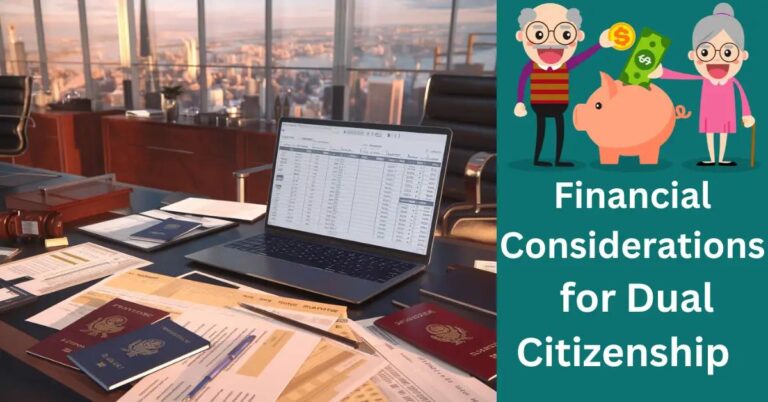TL;DR:
Part-Time Retirement Abroad: Plan by defining desired lifestyle and schedule; budget accurately for dual residency considering housing, food, travel, and healthcare; use free financial planning tools; keep flexible plans and seek advice from expat financial advisors.
Tax Implications: Understand different tax laws and seek advice on dual taxation agreements to avoid double taxation; consult international tax advisors, and stay updated on changing tax regulations.
Best Places for US Retirees: Consider expat-friendly countries like Mexico, Portugal, Costa Rica, Japan, and New Zealand for affordability, safety, and cultural experiences; personal values and needs determine the best fit.
- Managing Finances and Investments: Optimize international banking options; maintain a diversified investment portfolio; consider a foreign bank account for local transactions, and use dual currency cards for convenience.
Are you dreaming of living abroad part-time in retirement but worry about finances? You're not alone. I'm here to guide you through smart financial planning for a smooth transition. We'll cover creating a flexible retirement plan, budgeting for dual residency, and exploring tools to aid your journey. This isn't just a dream—it's a plan! Let me share how you can retire abroad part-time with confidence.
Financial Planning: How to Retire Abroad Part-Time?
Planning for part-time retirement abroad begins with knowing your dreams. Ask yourself: "How do I plan a part-time retirement?" Start by outlining your schedule and style of living. Identify what you want in each locale. Picturesque islands or bustling cities; what fits best?
Budgeting for dual residency is vital. Calculate the cost of maintaining two homes. Think about housing, food, travel, and healthcare. Don’t just guess. Use detailed estimates and adjust costs for each country.
To help you, there are many financial planning tools. These tools will help you see where your money goes. Many people ask online, "What about free financial planning for part-time retirement abroad?" Yes, several financial planning resources offer free insights and tips. Use these to track savings and spending.
Your plan must be flexible. Circumstances change, so should your plan. Adjust to the cost of living changes at home and abroad. You might need to tweak plans based on economic shifts or personal preferences. Flexibility ensures you balance life at home and life overseas.
Getting advice from expat financial advisors is smart. They offer unique views on living abroad. Their experiences help avoid surprises in foreign lands. They know about local rules and can guide you. Professionals help you navigate laws you might not know about.
In summary, be clear on goals, budget wisely, and seek expert help. Enjoy your time abroad by planning ahead. Make sure retirement is on your terms, combining the best of both worlds.
What are the Tax Implications of Retiring Abroad?
Taxes abroad can get confusing, but I can simplify them for you. When retiring overseas, understand how taxation works across countries. Each country has different rules, and sometimes you might get taxed twice without proper planning. This is where dual taxation agreements come into play. These agreements can help you avoid getting taxed in both the USA and your new country. They decide which country taxes you on what income type and amount.
Let's say you're retiring overseas from the USA. Look into any dual taxation agreements that your new country has with the USA. These agreements can save you money each year and make life easier. Knowing these details can help you rest easy during your retirement.
When you consider moving, also consult with international tax advisors. These experts can give you personalized advice based on your situation. They know what tax laws affect you and can offer helpful strategies. Always ensure you get advice from someone who understands the tax rules of both countries involved.
Also, keep an eye on any changes in tax laws and regulations abroad. Laws can shift, and what worked last year might not work this year. Many countries adjust their tax policies often, especially those with popular expat spots. Being informed can help you avoid surprises.
For extra help, the IRS website provides clear examples and forms you might need. Reading through it can give you a solid start on understanding these taxes.
Staying informed about taxes helps you make smarter decisions for yourself. Taxes are not the most exciting topic, but they are crucial when planning for retirement abroad.
Where is the Best Place for US Citizens to Retire Abroad?
Choosing the best place to retire can feel daunting. But knowing what you want helps. Some US citizens look for expat-friendly countries. These spots often have minimal language barriers. In these places, daily tasks feel simpler. Locals might know English, easing communication.
Affordability plays a big role in retirement decisions. Countries like Mexico and Portugal rank high. They offer great living standards at lower costs. With their vibrant cultures, they appeal to many retirees.
The political climate matters too. Some countries feel safer or have stable governments. Costa Rica, for one, prioritizes peace and democracy. Such qualities attract retirees seeking a quiet life.
Understanding local traditions and holidays helps. In places like Spain, the siesta slows down afternoons. This pace might surprise or delight retirees. Local customs give a taste of cultural adaptation needed.
Where is the best place for US citizens to retire abroad? The best place is subjective; it depends on personal needs. For some, Thailand with its low costs fits. Others might prefer Italy for its rich history. Exploring various destinations can reveal the perfect match.
Safety is another major factor. Countries with low crime rates make better homes. Nations like Japan and New Zealand are noted for safety.
If considering early retirement, look into workplace options. Some countries allow part-time or remote work. This can supplement income without extra taxation.
In sum, the best retirement destination hinges on personal values. It might be an expat-friendly place with affordable living. Or, perhaps it's a land rich in culture with warm locals. Researching thoroughly can lead to that ideal spot. For more help on selecting a retirement destination, explore resources from those who have made this journey.
How can I manage finances and investments while living abroad part-time?
Managing money while retiring part-time abroad can be tricky. The first step is to optimize international banking options. Look for banks with branches in multiple countries. This way, you avoid high fees and get better currency exchange rates. Understanding how local currency works is key.
Next, managing investments is crucial. But how do you focus on foreign markets? Diversify your portfolio with stocks or funds that operate internationally. Keep track of the different markets as they change. This approach helps spread risk and boosts your savings.
Opening a foreign bank account can make transactions easier. How? It lets you pay local bills without high fees. Plus, it might come with benefits like local interest rates or services.
But what are the pros and cons of maintaining finances from afar? Here's a quick answer: convenience comes with challenges. Handling finances from your home country keeps things familiar. But you might miss out on local financial opportunities.
Now, let's dive deeper. Keeping a bank account at home helps with regular expenses and pensions. Yet, imagine needing cash when the account faces restrictions. That's where a foreign account, with access anytime, shines.
Finally, think about dual currency cards. They let you pay in local or foreign currencies. This flexibility can save money on fees and make travel simpler. Managing your finances this way could make your part-time retirement smoother and stress-free.
Planning ahead—while understanding banking, investments, and accounts—can make retiring abroad a dream come true. Staying informed and aware of financial tools can ease the part-time retirement journey.
Conclusion
Planning part-time retirement abroad requires careful thought and preparation. First, consider your retirement goals and how part-time living suits them. Make a budget that supports dual residency. Use tools and resources to plan financially. Flexibility is key to balancing life here and abroad. For tax concerns, understand international taxation and consult advisors. Choose retirement spots wisely, considering culture and safety. Managing finances abroad involves using global banking and investment options. With the right approach, part-time retirement abroad is not only possible but can be deeply rewarding.







